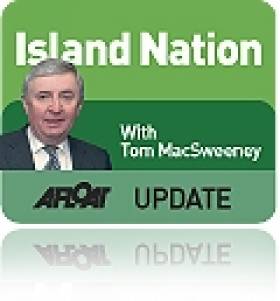Displaying items by tag: United Nations
United Nations Members Agree on Unified Treaty to Protect Biodiversity in the High Seas
After more than 20 years, United Nations members have agreed on a new framework to protect marine life in international waters, as The Journal reports.
The historic treaty was reached late on Saturday night (4 March) at the UN Headquarters in New York following two weeks of discussions.
It will see the creation of a new body to manage conservation of ocean life as well as establish marine protected areas in the high seas.
The move could be a boon to migratory marine wildlife including whales, dolphins, turtles and fish — protections on which have until now been hindered by a lack of legislative unity across various ocean territories.
The treaty also sets ground rules for conducting environmental impact assessments for commercial activity. “It means all activities planned for the high seas need to be looked at, though not all will go through a full assessment,” said Jessica Battle of the Worldwide Fund for Nature.
President Michael D Higgins has welcomed the treaty as “a gain for the future of humanity”.
He added: “It is essential that attention now swiftly moves to formal adoption of the text, to ratification and to implementation.
“Time is of the essence if the 30x30 pledge made by countries at the UN biodiversity conference in December to protect a third of the sea by 2030 can be reached. A target which must be considered a bare minimum.”
Navies Northern Adventure Head for 'Foyle Days'
On the naval front, LE Emer was built in Cork's Verolme Dockyard in 1978. She represents the oldest of the eight-strong fleet and is designed from the Naval Service's first purpose built patrol vessel OPV LE Deirdre (P20) but was modified to improve her stability and speed. This vessel was decommissioned several years ago and was converted into a private yacht.
The original BOFORS 40mm L60 gun of the LE Emer was recently upgraded to a BOFORS 40mm L70 to improve range and accuracy of her main armament. She alongside her 65m sisters LE Aoife (P22) and LE Aisling (P23) where all built primarily to patrol the Irish section of the European Economic Zone (EEZ).
During their careers the 'Emer' class vessels have also completed numerous re-supply missions to Irish troops serving overseas with the United Nations and in particular in the Lebanon. A crew compliment of 46 (5 officers) operate the vessels which are all now in their fourth decade of service.
OPV HMS Severn is the third of four 'River' class offshore patrol vessels and like her Irish counterpart is deployed on fishery duties. The 1,677 displacement tonnes vessel was built in 2001 in the UK'S south coast port of Southampton at Woolston Docks. Her home port for the 30 crew is at HM Naval Base in neighbouring Portsmouth.
She becomes the fifth ship to bear the name and with sisters HMS Mersey (P 282) and HMS Tyne (P 281) they are assigned to the Fishery Protection Squadron. Click the ship's diary to follow the ship news. The final member of the River class HMS Clyde (P 257) serves as a Falklands Islands Patrol Vessel (FIPV).
- yacht
- Clipper Round The World Race
- naval service
- Derry
- Royal Navy
- Londonderry
- Ports and Shipping News
- JOHANNA LUCRETIA
- Verolme Cork Dockyard
- United Nations
- Foyle Days
- Offshore Patrol Vessel
- Maritime Festivals
- LE Emer
- Emerclass
- LE Deirdre
- HMS Mersey
- Riverclass
- Schooner
- HM Naval Base Portsmouth
- Falklands Islands
Conference Hopes to Bin Ocean Debris
It was very topical, because this week the Fifth International Marine Debris Conference is taking place in Hawaii, organised jointly by the National Oceanic and Atmospheric Administration and the United Nations Environment Programme. This is an attempt to deal with the increasing problem of debris in the oceans of the world.
A United Nations report revealed some pretty frightening facts to the conference. Just two kinds of rubbish make up more than half the marine debris in the world. One is predictable enough – the horror of plastic choking sea life. The other came as more of a shock. The second most abundant kind of marine litter is smoking-related. Cigarette butts and packing account for nearly half of all sea rubbish in some parts of the world, according to the UN.
About 40 per cent of the litter in the Mediterranean Sea comes from this source. In Ecuador, smoking-related refuse accounted for more than half of coastal rubbish.
Ocean debris is a severe threat to the marine eco system. It kills at least 1 million sea birds and 100, 000 mammals each year, according to the United States National Oceanic and Atmospheric Association. The general prognosis at the conference in Hawaii has been pretty grim. Things are getting worse and it is the fault of humans on land using the oceans as rubbish dumps.
As my grandson's homework showed, it takes two weeks for a bit of fruit thrown into a river or the sea to bio-degrade. It will be two months before a piece of cardboard breaks down, three months for a milk carton and matters get worse where a cigarette butt is concerned. That will take ten years to disintegrate, a Styrofoam coffee cup 50 years, a plastic bag over a hundred and the six-pack ring so often tossed overboard from boats 400 years, with the plastic bottle even worse at 450 years.
The threat and impact of marine debris have long been ignored. Perhaps it is the perceived vastness of the ocean and lack of visibility of marine debris, but the teachers in Crosshaven national school, on the edge of Cork Harbour deserve praise for making their young pupils aware of what throwing litter into a river or dumping it on a beach does.

























































